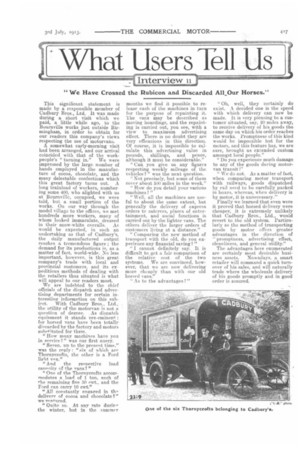What Users Tell Us
Page 11

If you've noticed an error in this article please click here to report it so we can fix it.
' Interview it e"..1141.9.-k ek4
"We Have Crossed the Rubicon and Discarded All Our Horses."
This significant statement is made by a responsible member of Cadbury Bros., Ltd. It was made during a short visit which we paid, a little while ago, to the BOurnville works just outside Birmingham, in order to obtain for our readers this company's views respecting the use of motorvans.
A somewhat early-morning visit had been arranged, and our arrival coincided with that of the workpeople's "turning in." We were impressed by the large number of hands employed in the manufacture of cocoa, chocolate, and the many delectable confections which this great factory turns out. A long trainload of workers numbering some 400, who alighted with us at Bournville, occupied, we were told, but a small portion of the works. On our way through the model village to the offices, we met hundreds more workers, many of whom looked immaculate, dressed in their snow-white overalls. As would be expected, in such an undertaking as that of Cadbury's, the daily manufactured output reaches a tremendous figure ; the demand for its productions is, as a matter of fact, world-wide. No less important, however, is this great company's trade with local and provincial customers, and its expeditious methods of dealing with the retailers thus situated is what will appeal to our readers most.
We are indebted to the chief officials of the dispatch and advertising departments for certain interesting information on this subject. With Cadbury Bros., Ltd., the utility of the motorvan is not a question of degree. As dispatch equipment it stands nre-eminent ; for horsed vans have been totally discarded by the factory and motors subst4uted for them.
"How many machines have you in service ? " was our first ouery.
"Seven. 1.1D to the present time," was the reply "six of which are Thornycrofts, the other is a Ford light wsn."
"And the respective load cans city of the vans? "
"One of the Thorn ycrofts accommodates a load of I ton, each of +he remaining five 30 cwt., and the Ford can carry 10 cwt."
"All constantly enga,ged in tips delivery of cocoa and chocolate?" we ventured.
" Quite so. At any rate durins, the winter, but in the summer
months we find it possible to release each of the machines in turn for the purpose of repainting it The vans may be described as moving hoardings, and the repainting is carried out, you see, with a view to maximum advertising effect. There is no doubt they are very efficacious in this direction. Of course, it is impossible to calculate this advertising value in pounds, shillings, and pence, although it must be considerable."
"Can you give us any figures respecting weekly mileage of the vehicles ? " was the next question.
"Not precisely, but sonie of them cover about 500 miles in the week."
"Row do you detail your various machines?"
"Well, all the machines are useful to about the same extent, but generally the delivery of express orders to caterers, places of entertainment, and social functions is carried out by the lighter vans. The others deliver the larger orders of customers living at a distance."
"Comparing the new method of transport with the old, do you experience any financial saving?"
" f cannot definitely say. It is difficult to get a fair comparison of the relative cost of the two systems. We are convinced, however, that we are now delivering more cheaply than with our old horsed vans."
"As to the advantages?" " Oh, well, they certainly do exist. A decided one is the speed with which delivery can now be made, It is very pleasing to a customer situated, say, 20 miles away, to receive delivery of his goods the same day on which his order reaches the works. Promptness of this kind would be impossible but for the motors, and this feature has, we are sure, brought us extended custom amongst local people." "Do you experience much damage to any of the goods during motorvan transit ?"
"We do not. As a matter of fact, when comparing motor transport with railways, goods dispatched by rail need to be carefully packed in boxes, whereas, when delivery is by motor, it is unnecessary."
Finally we learned that even were it proved that horsed delivery were cheaper, it is extremely unlikely that Cadbury Bros., Ltd., would revert to the old system. Particularly as the method of transporting goods by motor offers greater advantages in the direction of "promptness, advertising effect, cleanliness, and general utility."
The advantages here enumerated are certainly most desirable busi ness assets. Nowadays, a smart retailer will command a quick turnover of his sales, and will naturally trade where the wholesale delivery of his goods promptly and in good order is assured.


































